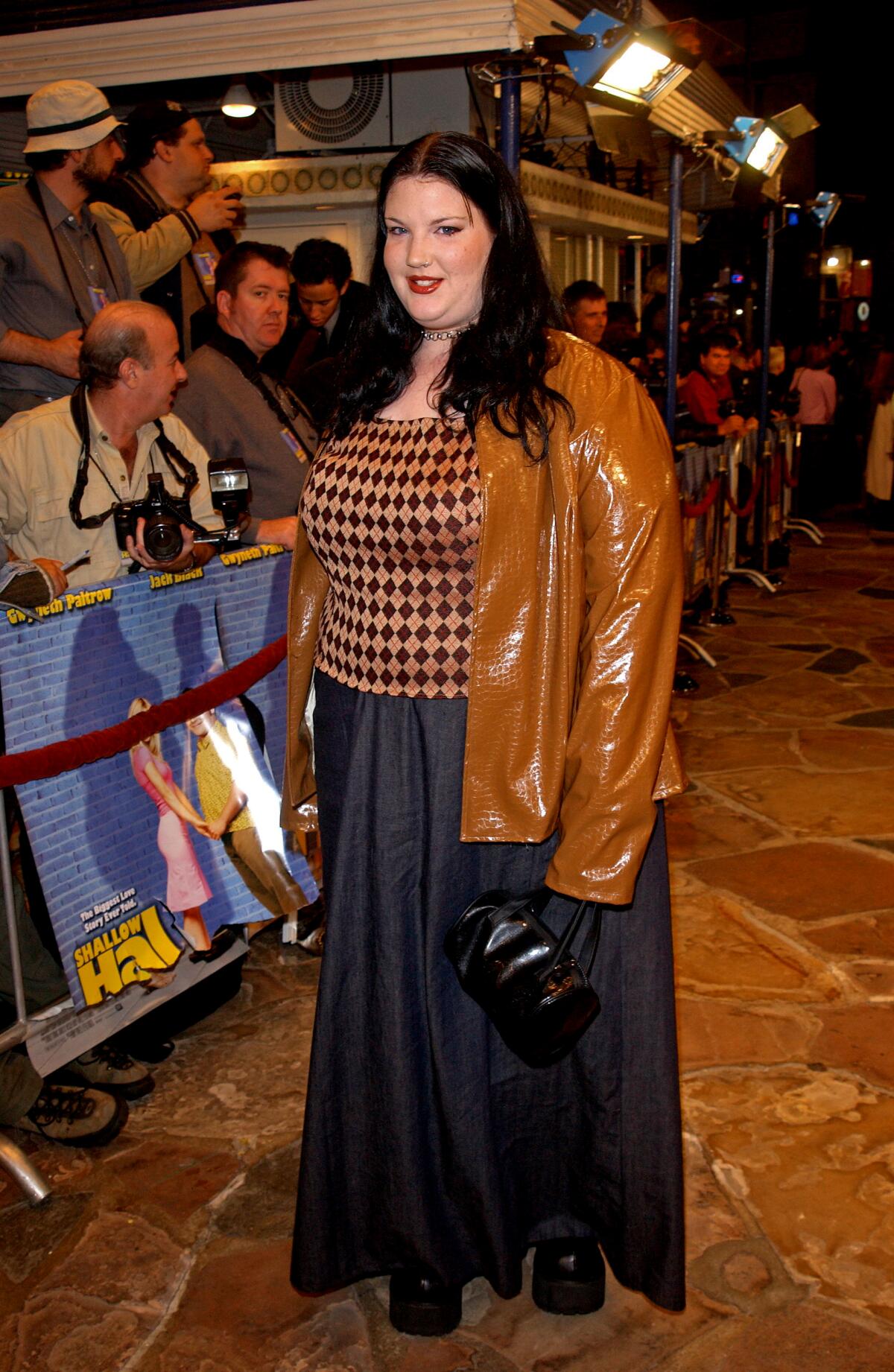Gwyneth Paltrow’s ‘Shallow Hal’ body double says she ‘hated’ her body by the end of filming and was left with eating disorders

- Share via
Content warning: This story includes descriptions of eating disorders.
Ivy Snitzer, who played Gwyneth Paltrow’s body double in the 2001 film “Shallow Hal,” is speaking out about the struggles she has faced since the release of the problematic comedy.
The 42-year-old says that in the years after the Farrelly brothers’ comedy premiered, she suffered from an eating disorder and nearly died due to a botched weight-loss surgery.
The movie, which stars Paltrow and Jack Black, centers around Hal (Black), a man known for his womanizing ways. In a turn of events, he is hypnotized into seeing potential love interest Rosemary (Paltrow in a fat suit) as a thin and “beautiful” person. The notably skinny-person-obsessed Hal, no supermodel himself, proceeds to fall in love with Rosemary by the end of the film.
But by the end of filming, Snitzer recalled, she had a negative view of her own body.
Movies* Some advocates for overweight people say the comedy’s use of fat jokes perpetuates the skin-deep stereotypes its makers set out to debunk.
“I hated my body the way I was supposed to,” she told the Guardian. “I ate a lot of salads. I had eating disorders that I was very proud of.”
Movies * Even behind the scenes, Gwyneth Paltrow’s form-fitting costume takes on a larger meaning.
A 2001 Times story quoted one critic of the movie as saying that “Shallow Hal” “fed on recycled fat jokes and perpetuated the last culturally accepted stereotype: that fat women are pathetic, ugly and safe targets for humor.”
The body double, who was 20 and an aspiring actor-comic when she worked on “Hal,” initially disagreed with that view of the comedy. “At that point, if you saw someone obese in a movie, they were a villain,” she told the Guardian, adding that Rosemary “was cool, she was popular, she had friends.”
Snitzer embarked on a weight loss journey in 2003 and opted to get gastric bypass surgery. She also exercised excessively, purged and severely restricted calories during that period. “It didn’t occur to me that I was supposed to be ashamed of those behaviors.”
In the months after her surgery, the band that constricted her stomach slipped and she developed gastric torsion. Unfortunately for Snitzer, the incident occurred while she was uninsured, and she had to wait three months after securing a job to get access to healthcare. During that period she was unable to consistently keep food down.
The Farrelly brothers’ “Shallow Hal” is the darndest thing.
Snitzer’s health condition was so dire by the time she got access to healthcare that doctors had to put her on liquid nutrition for four months before operating on her stomach.
“I was so thin you could see my teeth through my face and my skin was all gray. ... Humans shouldn’t have to experience how very bleak that particular time in my life was,” Snitzer said.
In spite of all that has happened to her and how the world’s views have shifted, Snitzer still doesn’t hold a grudge against the existence of “Shallow Hal,” which she said didn’t make her feel bad about herself until other people started telling her she probably should.
Gwyneth Paltrow gathered the Gooperati in Santa Monica to talk menopause and hormones, which have become the boogeyman in women’s wellness.
Snitzer still expressed gratitude and said she found joy in most of her on-set experiences. The cast and crew treated her “like I really mattered, like they couldn’t make the movie without me,” she said, and she felt “really comfortable” when being filmed. She thought Black was a “delightful person” and Paltrow was “really nice” — the “Contagion” star even regularly complimented Snitzer’s acting.
Snitzer now owns an insurance agency in Philadelphia.
“I love that it’s a cool thing I did one time,” she said.
If you or someone you know is dealing with an eating disorder and needs help, the National Eating Disorders Association helpline is 1-800-931-2237; for 24/7 crisis support, text “NEDA” to 741741.
More to Read
Only good movies
Get the Indie Focus newsletter, Mark Olsen's weekly guide to the world of cinema.
You may occasionally receive promotional content from the Los Angeles Times.











